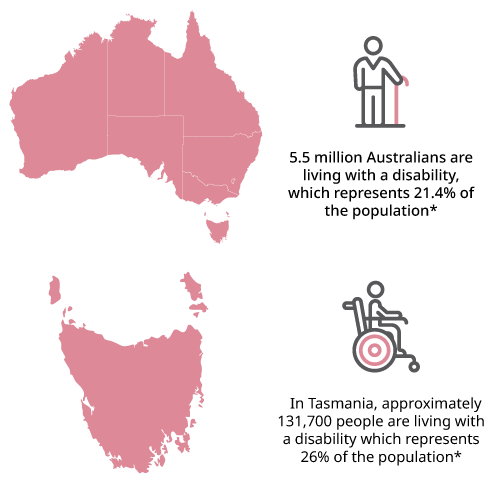
Have you ever thought about a job where you can make a real difference in someone’s life? A career in Disability Support might be just what you’re looking for! This field is growing fast because more people are recognising the importance of supporting those with disabilities. There are many different jobs in Disability Support, from working in people’s homes to helping out in community centres. No matter what role you choose, you’ll need to be caring, patient, and ready to help others.
What is Disability Support Work?
Disability Support Work is all about helping people with disabilities live fulfilling, independent, and inclusive lives. The goal is to create a society where everyone can participate fully and live with dignity.


*Source – Australian Bureau of Statistics 2022
What do Disability Support Workers do?
Disability Support Workers provide various services to meet the needs and goals of people with disabilities, such as:
- Daily Living Support: Helping with everyday activities like getting ready, eating, going to appointments, preparing meals, shopping, and home maintenance.
- Community and Social Participation: Encouraging socialising and participation in activities like meeting friends, joining clubs, playing sports, attending events, and taking courses.
Support can be provided in different places, including the person’s home, community locations (like parks or shops), centre-based programs, therapy centres, workplaces, shared living arrangements, and respite accommodations.

What makes a great Disability Support Worker?
If you enjoy making a positive impact, are empathetic, like solving problems, and are committed to learning, a career in Disability Support might be for you. This work offers personal fulfilment, professional growth, flexibility, and the chance to help create a more inclusive society.
Great Disability Support Workers are:
- Person-Centred
- Accepting of others
- Empathetic and understanding
- Honest and trustworthy
- Respectful and caring
- Passionate and patient
- Good at communicating and listening
- Able to work in a team and individually

Training and Qualifications
The most common qualification is a Certificate III in Individual Support, which covers all aspects of a support worker’s role, including daily activities and personal care. You can complete this through VET and traineeships while still in school. Some may also pursue a Certificate IV in Disability Support.
Adding to your knowledge and skills
In addition to a Certificate III and/or IV, you will need a First Aid Certificate and possibly a police check. To work with NDIS participants, an NDIS Worker Screening Check is required. Other useful courses include the NDIS Quality and Safeguards Commission’s learning modules.

Job roles and career pathways
If you are looking for entry-level roles in front line Disability Support, you will need to search for jobs with titles like these:
- Direct Care Worker
- Disability Support Worker
- Lifestyle Support Worker
- Personal Care Assistant
Once you have more experience or qualifications, a world of job opportunities opens up. Additional qualifications are needed for roles like Home Modification Tradespeople, Registered Nurses, Allied Health Professionals (Occupational Therapist, Physiotherapist, Psychologist), Trainers and Assessors, and NDIS Navigators. The skills you develop in the disability sector are transferable to many professions.
Take the next step
If you’re passionate about making a positive impact and helping others, a career in Disability Support could be the perfect fit for you. This field offers a variety of roles and opportunities to work in different environments, all aimed at improving the quality of life for individuals with disabilities. By choosing this path, you’ll not only gain valuable skills and experiences but also contribute to building a more inclusive and supportive community.
Interested in exploring other career opportunities in healthcare?
The healthcare sector offers a wide range of rewarding roles, each playing a vital part in improving lives and strengthening communities. Whether you’re curious about medicine, nursing or allied health roles, there’s a pathway that could align with your interests and strengths.
Visit Careerify’s Healthcare Industry Insights page to discover more opportunities and find the path that’s right for you.
